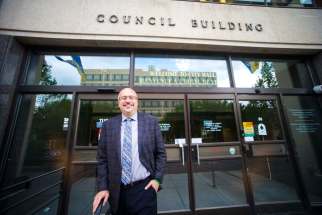Ontario’s sex-ed strategy a big step backward
Read this article for free:
or
Already have an account? Log in here »
To continue reading, please subscribe:
Monthly Digital Subscription
$0 for the first 4 weeks*
- Enjoy unlimited reading on winnipegfreepress.com
- Read the E-Edition, our digital replica newspaper
- Access News Break, our award-winning app
- Play interactive puzzles
*No charge for 4 weeks then price increases to the regular rate of $19.00 plus GST every four weeks. Offer available to new and qualified returning subscribers only. Cancel any time.
Monthly Digital Subscription
$4.75/week*
- Enjoy unlimited reading on winnipegfreepress.com
- Read the E-Edition, our digital replica newspaper
- Access News Break, our award-winning app
- Play interactive puzzles
*Billed as $19 plus GST every four weeks. Cancel any time.
To continue reading, please subscribe:
Add Free Press access to your Brandon Sun subscription for only an additional
$1 for the first 4 weeks*
*Your next subscription payment will increase by $1.00 and you will be charged $16.99 plus GST for four weeks. After four weeks, your payment will increase to $23.99 plus GST every four weeks.
Read unlimited articles for free today:
or
Already have an account? Log in here »
Hey there, time traveller!
This article was published 25/07/2018 (2701 days ago), so information in it may no longer be current.
Ontario’s new premier, Doug Ford, seems to think students in his province can make do just fine with sex ed from the previous century.
That was the message his Progressive Conservative government sent when it announced the K-12 physical health curriculum guide, introduced by the previous Liberal government in 2015, would be replaced by an earlier version that had last been updated in 1998.
That might please Ontarians who wish firmly to ignore facts of daily life such as the internet, gay marriage, social media, consent and gender identity, but it won’t help children and teens learn how to navigate relationships in the century they’ve been born into. The updated curriculum includes introducing, at an early age, concepts such as consent, in the context of treating others well and preventing bullying.
Grown men clutching their pearls at “how are we to know what’s appropriate or not” in the #MeToo era could ask a Grade 1 student, who would have learned how to “recognize caring behaviours (listening with respect, giving positive reinforcement, being helpful) and exploitative behaviours (inappropriate touching, verbal or physical abuse, bullying), and describe the feelings associated with each.” Smiling, saying hello? Respectful. Negatively pressuring someone into doing something they’re uncomfortable with? Not so much.
These skills, like many to do with physical, mental and emotional well-being, take time to develop fully, but are understandable from a young age. Ignoring them in the early years and then screaming “Just say no!” at teenagers is not a replacement for a long-term, nuanced approach.“These skills, like many to do with physical, mental and emotional well-being, take time to develop fully, but are understandable from a young age”
One of the claims made during the Ontario election campaign, and since, is that the 2015 curriculum was created without consulting parents. However, according to that province’s ministry of education, in 2014 it surveyed approximately 4,000 parents, one for every elementary school in the province, in addition to more than 2,000 educators and hundreds of students.
The sex-ed components of provincial health curriculums vary widely across Canada. Manitoba’s educational resource for teaching human sexuality for kindergarten to Grade 8 is a document published in 2005. (However, considering that it is part of a larger health curriculum, it should be noted that other aspects have more recently been updated — for example, resources touching on cannabis were added this year, and guidelines for physical activity in schools were updated in 2016.)
Nova Scotia’s curriculum was updated in 2011 to include LGBTTQ* issues and topics such as cyberbullying and consent. Nova Scotia is also the province where Rehtaeh Parsons was sexually assaulted by four teens, and lived through the additional humiliation of photos being shared on the internet. She committed suicide in 2013. Ms. Parsons’ father, Glen Canning, has defended Ontario’s 239-page curriculum from 2015, saying that if it been in place before his daughter’s assault, it would have meant the difference between life and death. Understanding the meaning of consent, and the effects of cyberbullying, can save lives.
Mr. Ford, whose ascension could rightly be viewed as part of politics’ current populist wave, has since said his government plans to hold consultations on the “new” curriculum guide. That’s a good thing, if it’s being done with the genuine intention of improving it. If it’s merely to provide cover for undoing the current guide for ideological reasons, it will do little but put young people at risk.
As populist ideas tighten their grip on public discourse, it’s more important than ever to let practicality — in the form of facts and common sense — guide the way we teach our children.










